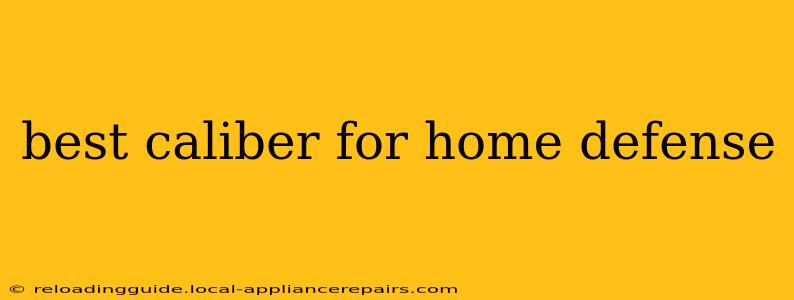Choosing the right caliber for home defense is a crucial decision, impacting your safety and the effectiveness of your self-defense strategy. There's no single "best" caliber, as the ideal choice depends on several factors, including your experience level, physical capabilities, and the specific characteristics of your home and surroundings. This guide will explore popular calibers and help you make an informed decision.
Factors to Consider When Choosing a Caliber
Before diving into specific calibers, let's outline the key considerations:
-
Stopping Power: This refers to a round's ability to incapacitate an attacker quickly and effectively. Larger calibers generally offer greater stopping power, but this isn't the only factor. Bullet construction and placement are equally vital.
-
Recoil: Excessive recoil can hinder accuracy, especially in stressful situations. Lighter calibers generally have less recoil, making them easier to control, particularly for smaller or less experienced shooters.
-
Overpenetration: A significant concern in home defense is the risk of a bullet passing through the intended target and injuring an innocent bystander or damaging property. This is particularly relevant in densely populated areas or homes with thin walls.
-
Accuracy and Control: Even the most powerful caliber is useless if you can't hit your target. Accuracy is paramount, and choosing a caliber you can consistently and accurately shoot under pressure is essential.
-
Ammunition Availability and Cost: Ensure readily available and affordable ammunition for your chosen caliber.
-
Personal Preference and Experience: Ultimately, the best caliber is one you're comfortable and proficient with.
Popular Calibers for Home Defense
Let's examine some of the most commonly used calibers for home defense:
9mm
- Pros: Moderate recoil, high capacity magazines, readily available and relatively inexpensive ammunition, manageable for most shooters.
- Cons: May require multiple shots for effective incapacitation compared to larger calibers. Overpenetration is a potential concern depending on ammunition choice.
.40 S&W
- Pros: Greater stopping power than 9mm, relatively controllable recoil for experienced shooters.
- Cons: More significant recoil than 9mm, potentially higher cost and less available ammunition than 9mm, higher overpenetration potential.
.45 ACP
- Pros: High stopping power, significant bullet diameter.
- Cons: Substantial recoil, lower capacity magazines compared to 9mm and .40 S&W, higher cost and potentially more challenging for smaller or less experienced shooters.
12 Gauge Shotgun
- Pros: Exceptional stopping power, particularly with buckshot or 00 buckshot rounds.
- Cons: Significant recoil, limited capacity, potentially more challenging to handle and aim accurately in close quarters, risk of overpenetration (especially with slugs).
.223/5.56
- Pros: Good accuracy and range, relatively flat trajectory. Some AR-15 platforms are comfortable for shooters of various sizes.
- Cons: Overpenetration is a significant concern, making it less than ideal for home defense in close quarters.
Beyond Caliber: Essential Considerations
Choosing the right caliber is only one piece of the puzzle. Equally important are:
-
Training: Regular practice and professional training are crucial to develop proficiency and safe firearm handling skills.
-
Ammunition Selection: Choose quality self-defense ammunition designed for expansion and controlled penetration. Consider hollow-point or expanding rounds to minimize overpenetration while maximizing stopping power.
-
Situational Awareness: Understanding your surroundings and recognizing potential threats is paramount to preventing conflicts.
-
Legal Considerations: Familiarize yourself with local and state laws regarding firearm ownership and self-defense.
Conclusion
The "best" caliber for home defense is subjective and depends on individual factors. Thoroughly research the options, consider your experience level, and choose a caliber you can accurately and confidently handle in a high-stress situation. Remember, proper training and situational awareness are equally critical components of effective home defense. Consult with firearms experts and law enforcement professionals for personalized advice.

